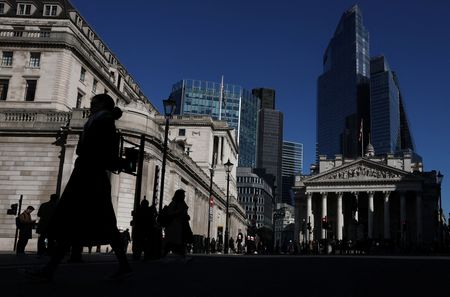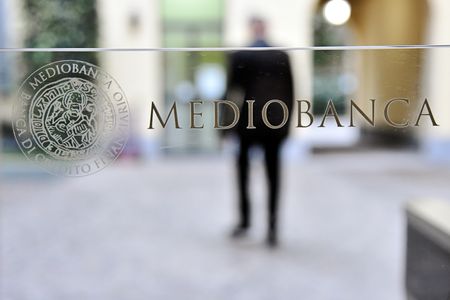By William Schomberg
LONDON (Reuters) -British businesses are having their strongest month in a year thanks to a rebound in the dominant services sector, according to a survey that suggests Britain’s economy is continuing to outperform those of other European countries.
The preliminary S&P Global UK Composite Purchasing Managers’ Index for August – published on Thursday – is welcome news for finance minister Rachel Reeves who has struggled to meet her promise to voters to speed up the economy.
But its suggestion of stronger inflation pressure might worry the Bank of England.
Sterling jumped by a fifth of a cent against the U.S. dollar as investors saw the unexpectedly strong reading as lessening the case for another BoE interest rate cut during 2025.
The PMI, covering manufacturing as well as services, picked up to 53.0 – its highest since August last year – from a final reading of 51.5 in July.
A Reuters poll had forecast only a small increase to 51.6.
By comparison, Germany’s PMI grew more slowly while in France activity remained below the growth threshold.
Britain’s economy posted the strongest economic growth within the Group of Seven large, rich nations in the first half of 2025, albeit at a pace which was slow by historic standards.
Chris Williamson, chief business economist at S&P Global Market Intelligence, said the survey suggested economic growth had accelerated over the summer after a sluggish spring.
“It’s evident from survey measures of order books, however, that the demand environment remains both uneven and fragile,” Williamson said.
“Companies report concerns over the impact of recent government policy changes, as well as unease emanating from broader geopolitical uncertainty,” he added.
Matt Swannell, chief economic advisor to forecasters EY ITEM Club, said the pickup should be treated with caution as the PMI had been a poor predictor for the economy so far in 2025.
“Economic conditions still point to sluggish growth,” Swannell said. “Inflation is rising as pay growth slows, fiscal policy is tightening, some households still must re-fix their mortgages to higher interest rates and uncertainty lingers.”
The PMI for the services sector rose to 53.6 from July’s 51.8.
But the manufacturing PMI weakened to 47.3 from 48.0, further below the 50.0 growth threshold and its lowest in three months as factories took a hit from the global trade war led by U.S. President Donald Trump.
A separate survey published by the Confederation of British Industry showed manufacturers suffered a fresh setback with orders falling heavily and further weakness expected ahead.
The PMI found companies shed jobs across the board, albeit less quickly than in July. Firms reported higher labour costs after Reeves raised payroll taxes for employers in April when a sharp increase in the minimum wage also took place.
Complicating the picture for the BoE, services firms increased prices at the fastest pace in three months.
Business activity expectations for the year ahead were the highest since October 2024.
(Writing by William Schomberg; Editing by Toby Chopra)









